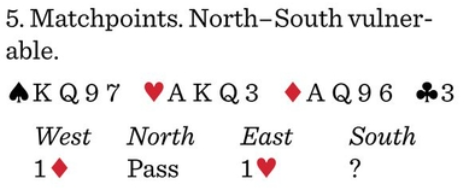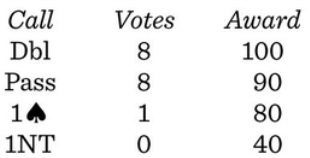
What’s your call?
| 1♠ | 1NT | |||
| 2♣ | 2♦ | 2♥ | 2♠ | 2NT |
| 3♣ | 3♦ | 3♥ | 3♠ | 3NT |
| 4♣ | 4♦ | 4♥ | 4♠ | 4NT |
| 5♣ | 5♦ | 5♥ | 5♠ | 5NT |
| 6♣ | 6♦ | 6♥ | 6♠ | 6NT |
| 7♣ | 7♦ | 7♥ | 7♠ | 7NT |
| Pass | Dbl |
Holding 20 HCP, the doublers refuse to sit idly by. And there’s always a chance that partner will bid spades, right? Right!
Meckstroth doubles. “Way too much to pass. I will need to bid notrump if partner bids clubs.”
“Double,” insists Cohen. “Yes, I’ll have to correct clubs to notrump, but I’m afraid the opponents are stealing, and if I pass now and enter later, partner will never realize how strong I am.”
The Sutherlins double and ask, “What else makes sense? We have too much to overcall 1♠ or pass. We should be able to handle any bid that partner makes – spades, clubs or even notrump. Partner can’t have a jump to 4♣, which could create a problem for us.”
Hampson doubles because he, too, believes the hand is flawed for any delayed action. His plan? “If partner bids 2♣ (expected), then I will bid notrump. Hopefully we will hear partner bid spades.”
Double by Lee. “I don’t like it with a singleton in an unbid suit, but this is our best shot at conveying the strength of the hand.”
Lawrence doubles. “I don’t expect East–West to do much more bidding. With luck, my partner will bid spades, which I can then raise to game. Passing is an option. Bidding 1♠ is not.”
Weinstein toys with the idea of bidding 1NT, but doubles instead. “I would consider a trap pass at other vulnerabilities, but not here. 1NT risks missing spades, which will play much better and might make a game opposite a fit and not much else.”
The passers are as frustrated as the doublers.
“Pass,” sighs Colchamiro. “Just a guess. I’m hoping they will bid clubs so I can back in with a double to show three suits. If lefty rebids 1NT and it comes back to me, I’ll double to show hearts and spades. If lefty psyched and passes, I’m toast.”
Sanborn considers a super-heavy, off-shape 1NT before she passes. “I will hopefully be able to compete next round with a better idea of where we are going. If I double this round, I will frequently have to fend off club bids from partner, forcing us too high when we don’t have the tricks or the fit to be in the auction.”
“I have nothing sensible to bid,” laments Falk. “I can’t make a one-suit takeout double. I’m not bidding 1♠, and I just have to wait and see if there will be an opportunity to sensibly enter the auction. If West psyched, he picked a good time.”
Meyers has faith in LHO. “I will get another chance. Pass for now, then I’ll bid if appropriate.”
“Pass,” says Korbel. “This might be the best hand I’ll ever hold that I might never take a bid on!”
Robinson’s in the weeds with the rest of the passers. “Maybe I can make a penalty double on the next round.”
Pass from Kennedy. “I’ll be back in with a double in a minute.”
Perhaps exhausted from the last problem, Rigal passes. “No idea what to do, but hoping to get a chance to double clubs next time and maybe take another call. This pattern really doesn’t feel like a 1♠ overcall, though I admit it might easily work.”
Boehm does try 1♠. “Maybe partner can eke out a raise. If my balancing double over West’s possible 1NT rebid is penalty (my preference) rather than a light takeout, that is a point in favor of a trap pass. If they stop in 2♦ or 2♥, however, I’ll have to pass and collect 50 per trick – probably inadequate compensation.”


